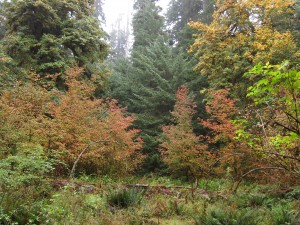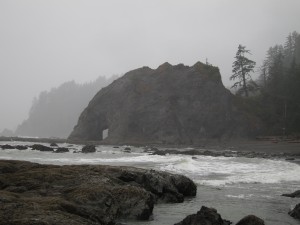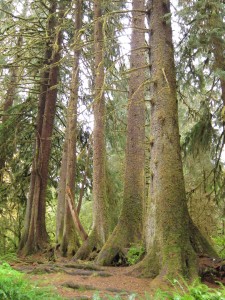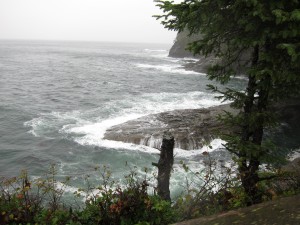
Up in the wilds, where the state of Washington meets the roaring waters of the Pacific, Nature demonstrates her greatest power. Trees, uprooted and tossed like toothpicks, land like daggers impaled in the sand. After a dry summer, a record-setting rain pelts the area, littering branches on the road. We dodge them and the standing water. Near Neah Bay, a rock slide causes us to slow the car.
Here at the end of the world, the farthest northwestern point on the Lower 48, it’s hard to imagine that for centuries the Makah Indians carved out a living here, quite literally, as they hollowed-out cedar trees to make boats for whale hunts. They traversed heady waters in these canoes, bringing food (tasting like cow, one Makah gentleman told me) to the tribe. The Makah were not relocated here by the white man; they lived here all along. Descended from Canada’s natives, the Makah reservation shrank over time with treaties left unfulfilled, but still exists. In Neah Bay, the Makah have a museum which proudly displays artifacts rare in that they were not captured by Europeans, but uncovered during an archeological dig. They are preserving their past and their language.
We are here to hike. We spend Friday on Rialto Beach not far from Forks (yes, Twilight fans, THAT Forks), where we will base for the weekend. We crawl over logs and rocks, colorful as though they, like the leaves, have turned vivid for autumn. The wind is at our backs, blowing rain onto the backside of our clothing, soaking us through. It’s the first rainy weekend of the season, and it feels appropriate. We walk the beach at low tide, our feet sinking into sand. Others pass us on the path, and we are all grinning, enlivened by the rough weather.

Saturday, we enter the Hoh Rainforest. Our hike there is hushed and reverent among fir, cedar, and western hemlock rising more than 200 feet into the sky. Moss drapes itself around tree limbs, and maples stand out against the evergreens with leaves of yellow and orange. Though nature is less dramatic here than at the Pacific, we pass a cedar that has fallen and blocked the path. Workers saw parts of it into manageable pieces so we can get by, but we are sobered at the thought that at any time, a tree could fall. The trunk will be left to rest here, where it will shelter new seedlings for new trees.

Sunday, we head to Neah Bay and the trail to Cape Flattery. We watch as water smashes against rock, polishing it and carving new patterns and holes. Yet sea lions and birds play on and in the water as though it was a peaceful pool.
We all live in life’s waters that sometimes batter us and take us to places we don’t want to go. We get up and do it all again, day after day, and before we know it, fifteen years have passed. Fifteen years since the day that nature’s forces battered me, too, separating me from my daughter, taking her from my arms before I’d even had a chance to get to know her. Fifteen years later, my heart still breaks, and yet I am frolicking, too. In the presence of nature raw and moody, I am alive. I am still here. I am seeing the great beauty of this world.
We humans have a capacity for resilience. No matter how mighty and intimidating and anguish-provoking nature can be, we who survive are stronger than that. I write about the death of a child today not for pity or even comfort, but to stand in strength. She gave me that. Nature gave me that.
On October 14th every year, I feel the sadness, yes, and all the grief all over again. Yet the Makah survive and flourish despite the white man’s intervention in their lives. Nature knocks down an ancient tree, but new trees form, perhaps in a beautiful collonade. And the course of my own life changed for the better because I had a daughter to love and to be with me, even though our time together wasn’t nearly long enough for me. We can withstand winds and rain and pain, more than we know. We are stronger than that.

I’m so sorry about your daughter, Nadine. You have captured the beauty and pain of nature in such a lovely way in this post. You have a true gift for taking nature and teaching us lessons from it.
Thanks, Tina. Sometimes I struggle to find my voice with this blog, but nature always points the way for me. I am most at home in the outdoors, I think, and troubles always dissipate there.
There can be such pain sometimes. I’m sorry this happened to you. Your description here is beautiful. I hope you are always able to take meaning from nature.
Thanks, Marlene. I’m so happy to have moved to an area where nature is everywhere. Although this was a driving trip of a few hours, I have access to lovely hiking trails right here in town. It’s so healing for me.
Bless you and thank you for sharing your truth. Makah have a magical place on earth. I’m glad you found some solace at our homeland. Peace.
When you say “Makah have a magical place on earth,” I believe you. I picked up several books in the museum and look forward to learning more. We moved to the Peninsula last spring, so this was my first time on your land. I hope it’s just the first of many!